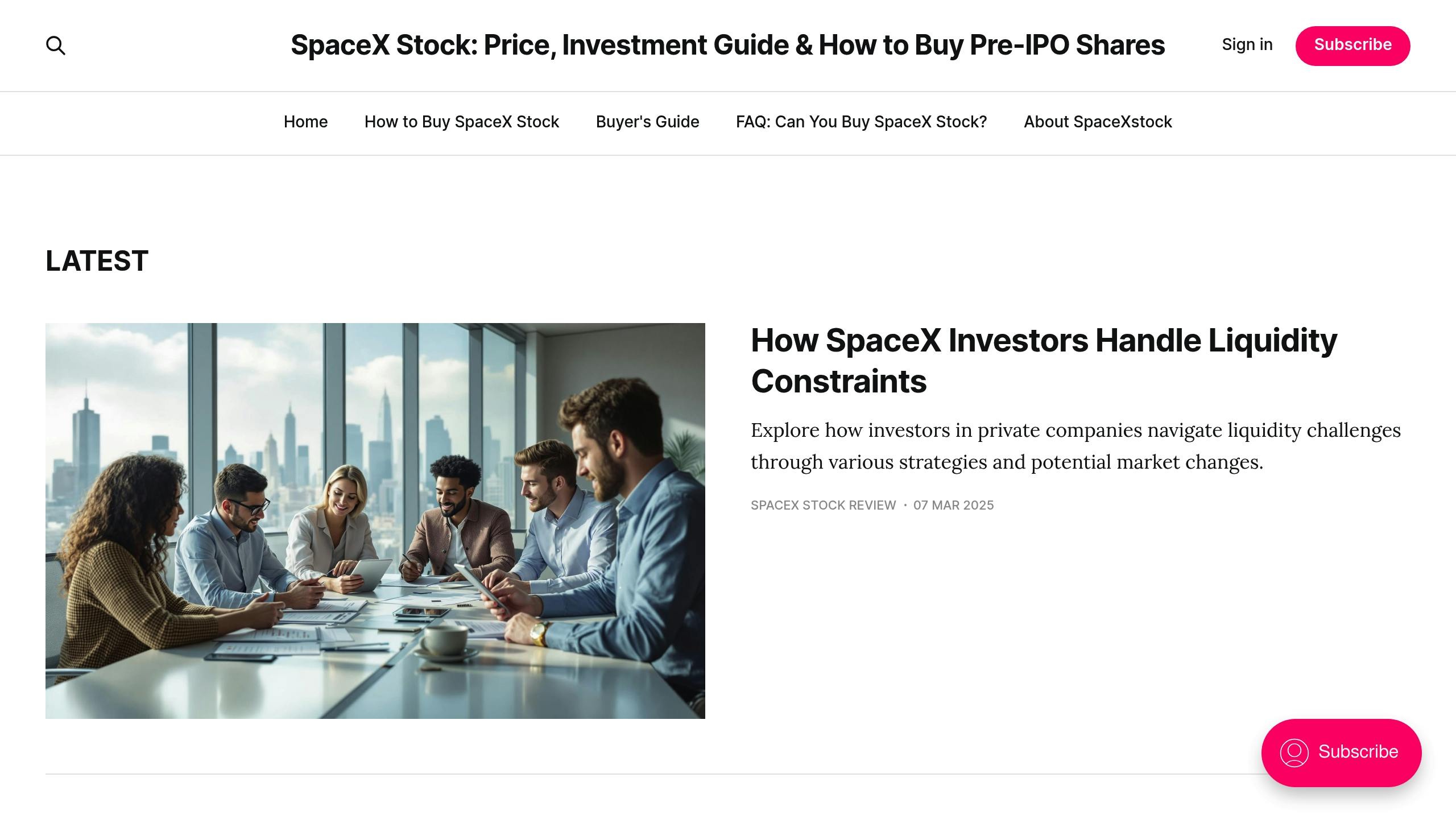SpaceX Business Model: Private vs Public Markets
Explore the trade-offs between private and public markets for SpaceX, examining how its current status fuels innovation and long-term missions.

SpaceX thrives as a private company by focusing on long-term goals like Mars colonization without the pressures of public markets. Staying private allows quick decision-making, flexible R&D spending, and protection of innovations. However, going public could unlock larger funding opportunities and increase visibility, but it risks slowing innovation due to shareholder demands and regulatory requirements.
Key Takeaways:
- Private Status Benefits: Independent decisions, fast innovation, and long-term focus.
- Public Status Potential: Access to broader funding, investor liquidity, and increased credibility.
| Aspect | Private Status | Public Status |
|---|---|---|
| Decision-Making | Quick and independent | Requires shareholder approval |
| Financial Focus | Long-term goals | Quarterly performance focus |
| Funding Access | Limited to private investors | Broad investor pool |
| Transparency | Minimal disclosure | Strict financial reporting |
SpaceX’s private model supports bold space exploration, but public markets could help fund its mission at the cost of flexibility.
Why Elon Refuses to Take SpaceX Public

Benefits of Private Company Status
SpaceX uses its private company status to drive its ambitious goals, particularly its long-term vision of space exploration. Staying private offers strategic benefits that align with its mission.
Freedom to Focus on the Mars Mission
By avoiding the pressures of public markets, SpaceX can fully concentrate on its Mars-focused research and development. This independence allows the company to:
- Dedicate resources to long-term Mars-related projects
- Partner with others without the constraints of public shareholder oversight
- Safeguard its technological advancements from public scrutiny
This freedom supports SpaceX's ability to make bold decisions and move swiftly, which is further enhanced by its streamlined decision-making process.
Quick Decision-Making Power
Being a private company gives SpaceX the flexibility to act quickly and adapt to changing needs. Here's how that plays out:
| Area | Private Company Edge | Impact on Operations |
|---|---|---|
| Technology Development | Faster prototyping and testing | Speeds up design improvements |
| Strategic Planning | Independent choices | Adapts quickly to new challenges |
| Resource Management | Flexible budgets | Seizes opportunities without delay |
| Intellectual Property | Greater confidentiality | Protects critical innovations |
This agility not only lowers costs for space launches but also pushes the boundaries of aerospace technology and efficiency. SpaceX's ability to pivot, allocate resources effectively, and protect its innovations keeps it ahead in the industry.
Reasons to Consider Going Public
While operating privately has its benefits, going public could open up new opportunities for SpaceX, especially when it comes to funding its ambitious projects like Mars colonization. Here’s a look at how a public transition could impact SpaceX's finances and market position.
Expanded Funding Opportunities
Entering public markets could provide SpaceX with access to much larger pools of capital. By going public, SpaceX would be able to attract a wider range of investors and raise significantly more funds. Here's a quick comparison:
| Funding Aspect | Private Market Challenges | Public Market Benefits |
|---|---|---|
| Capital Access | Limited to private investors | Access to a broader investor pool |
| Funding Scale | Constrained by private valuations | Opportunity for larger capital raises |
Liquidity for Investors and Employees
An IPO would let SpaceX's current investors and employees sell their shares on public exchanges, making it easier to turn their investments into cash. This added liquidity is a major perk for those who’ve been involved with SpaceX from the start.
Increased Visibility and Credibility
Becoming a public company could strengthen SpaceX’s position in the industry by enhancing its reputation and visibility. Some potential benefits include:
- Higher credibility with partners and customers
- Transparency through regular financial disclosures
- More media attention, boosting brand awareness
- Better access to strategic partnerships and government contracts
Of course, going public would also bring challenges, like navigating stricter regulations and maintaining the company’s innovative spirit. But the potential financial and market advantages could make the transition worthwhile for SpaceX.
Private vs Public: Business Impact
The decision to stay private or go public has a major influence on how SpaceX operates and manages its business. Here, we'll look at how these two paths differ when it comes to decision-making freedom and handling finances.
Decision Freedom vs Investor Rules
As a private company, SpaceX has the flexibility to make decisions quickly and independently, which aligns well with its long-term space exploration goals.
| Aspect | Private Status (Current) | Public Status (Potential) |
|---|---|---|
| Strategic Decisions | Controlled entirely by management | Requires input and approval from shareholders |
| Financial Reporting | Minimal disclosure requirements | Must submit quarterly reports and comply with SEC filings |
| Project Timeline | Focus on long-term goals | Likely to face pressure for short-term results |
| Risk Management | Open to high-risk, experimental projects | Subject to greater scrutiny over risky decisions |
This level of autonomy in decision-making is a stark contrast to the tighter financial and operational guidelines that come with going public.
Money Management Changes
How SpaceX manages its finances would also shift dramatically if it transitioned to public markets. Currently, as a private entity, SpaceX reinvests its profits into research and development without the need to pay regular dividends or worry about stock price stability, relying on private funding rounds instead.
If SpaceX were to go public, here’s what would change:
- Quarterly Performance Focus: Public companies must consistently show growth and profitability to keep investors satisfied, which could lead to short-term decision-making.
- Capital Allocation: While public markets open up broader access to funding, they also require stricter oversight of spending. Investments in R&D and major projects would face closer scrutiny and need detailed justifications.
- Regulatory Compliance: Going public comes with the burden of full financial transparency and meeting SEC regulations, which adds complexity and higher operational costs.
These financial shifts could directly affect SpaceX's ability to prioritize long-term projects and take the bold risks necessary for groundbreaking space exploration. While public status might bring in more capital, it could also slow down the company's ability to innovate at its current pace.
How to Invest in SpaceX
SpaceX is a private company, meaning its shares aren't available on public stock exchanges. However, there are ways for investors to tap into its growth through private market options. These typically include private equity funds, secondary market platforms, or employee stock plans. Keep in mind, these options often require accredited investor status and come with challenges like low liquidity, limited transparency, and long holding periods.
It's crucial to do your homework. Carefully review the regulations and understand the risks tied to the lack of market transparency. For more detailed information, check out the SpaceX Stock Investment Guide linked below.
SpaceX Stock Investment Guide

If you're interested in pre-IPO opportunities, the SpaceX Stock Investment Guide is a helpful resource. It offers educational materials and insights into private market investments. Topics include valuation trends, private equity strategies, and market analysis - giving you a solid starting point for exploring investments in companies like SpaceX. Platforms like UpMarket may also provide access to these private opportunities.
Make sure to conduct thorough research and consult a professional before investing your money.
Conclusion
SpaceX's private status plays a crucial role in driving its Mars-focused goals while allowing it to stay nimble. The company's approach highlights how operating in private markets can support long-term projects without the constraints of public market demands.
Key Takeaways
The choice between staying private or going public has a major influence on SpaceX's strategy and future plans. Here's a quick comparison of the two paths:
| Aspect | Private Status (Current) | Public Status (Potential) |
|---|---|---|
| Decision Making | Independent and quick decisions | Requires shareholder approval |
| Mission Focus | Prioritizes long-term Mars goals | Likely pressure for short-term gains |
| Funding | Relies on private investors | Access to larger public capital |
| Transparency | Limited public disclosure | Must adhere to financial reporting rules |
This table outlines the trade-offs SpaceX faces. Whether it remains private or transitions to public markets will depend on which structure best supports its mission to make life multiplanetary.
Comments ()